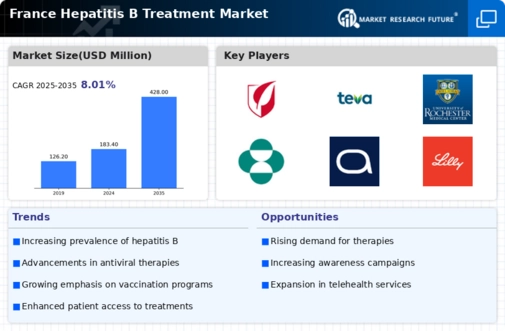Growing Awareness and Education
The growing awareness and education surrounding hepatitis B play a pivotal role in driving the hepatitis b-treatment market. Increased public knowledge about the disease, its transmission, and the importance of treatment has led to a rise in screening and diagnosis rates. Educational campaigns conducted by healthcare organizations and non-profits have been instrumental in informing the public about the risks associated with hepatitis B. This heightened awareness encourages individuals to seek medical advice and treatment, thereby expanding the patient base for the hepatitis b-treatment market. Furthermore, healthcare professionals are becoming more adept at recognizing and managing hepatitis B, which may lead to improved treatment rates. As awareness continues to grow, the market is expected to experience a corresponding increase in demand for effective treatment options.
Rising Prevalence of Hepatitis B
The increasing prevalence of hepatitis B in France is a critical driver for the hepatitis b-treatment market. Recent estimates indicate that approximately 0.5-1% of the French population is chronically infected with hepatitis B. This growing patient population necessitates effective treatment options, thereby propelling market growth. The rising awareness of hepatitis B and its potential complications, such as liver cirrhosis and hepatocellular carcinoma, further emphasizes the need for timely intervention. Consequently, healthcare providers are more inclined to adopt innovative treatment modalities, which could lead to an expansion of the hepatitis b-treatment market. As the healthcare system in France continues to prioritize infectious disease management, the demand for hepatitis B therapies is likely to increase, creating opportunities for pharmaceutical companies to introduce new products and improve existing treatment regimens.
Emerging Research and Development
Emerging research and development initiatives are crucial drivers of the hepatitis b-treatment market. Ongoing clinical trials and studies focused on novel antiviral agents and therapeutic strategies are paving the way for new treatment options. In France, several research institutions and pharmaceutical companies are actively engaged in developing innovative therapies that target hepatitis B. The potential for breakthroughs in treatment could significantly alter the landscape of the hepatitis b-treatment market. For instance, the exploration of combination therapies and immune-modulating agents may enhance treatment efficacy and patient outcomes. As these research efforts progress, they are likely to attract investment and collaboration, further stimulating growth in the hepatitis b-treatment market. The commitment to advancing research underscores the importance of addressing hepatitis B as a public health priority.
Government Initiatives and Funding
Government initiatives aimed at combating hepatitis B significantly influence the hepatitis b-treatment market. In France, public health campaigns and funding allocations for hepatitis B awareness and treatment programs have been on the rise. The French government has implemented strategies to enhance screening and treatment accessibility, which may lead to an increase in diagnosed cases and subsequently, treatment uptake. For instance, the allocation of €10 million for hepatitis B initiatives in recent years illustrates the commitment to addressing this public health issue. Such funding not only supports the development of new therapies but also facilitates the distribution of existing treatments, thereby expanding the market. As these initiatives continue to evolve, they are likely to create a more favorable environment for the hepatitis b-treatment market, encouraging innovation and improving patient outcomes.
Technological Advancements in Treatment
Technological advancements in treatment methodologies are reshaping the hepatitis b-treatment market. Innovations in drug formulation and delivery systems have led to the development of more effective antiviral therapies. For example, the introduction of long-acting injectable formulations has the potential to improve adherence among patients, which is crucial for managing chronic hepatitis B. Additionally, advancements in diagnostic technologies enable earlier detection and monitoring of the disease, facilitating timely treatment interventions. The integration of these technologies into clinical practice may enhance treatment outcomes and patient satisfaction. As the healthcare landscape in France continues to embrace technological progress, the hepatitis b-treatment market is likely to benefit from these advancements, leading to increased investment and research in novel therapeutic options.
















